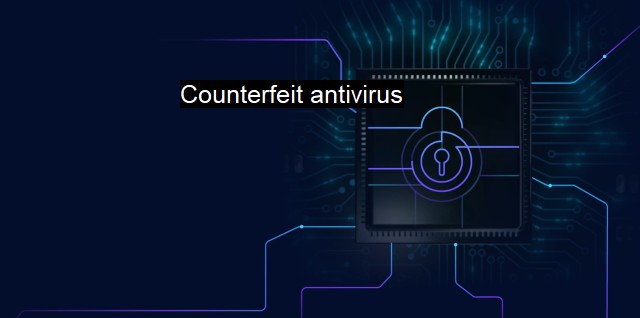What are Counterfeit antivirus?
Exploring the Threat of Counterfeit Antivirus: Deceptive Techniques and Protection Strategies for Users
Counterfeit antivirus, also known as rogue antivirus or fake antivirus software, is a type of malware that pretends to be a legitimate security software. It's instrumental in coherent and sophisticated cybersecurity attacks used by cybercriminals to request money from internet users and companies worldwide. It's designed to simulate real antivirus programs but instead of protecting your computer, they do precisely the opposite.Data security is fundamental in the computer age. Given the large amounts of critical personal and financial data stored on our devices, protecting these devices from various types of cyber threats is crucial. This has necessitated the use of various cybersecurity measures, which include firewalls and antivirus software. Among the many cybersecurity threats that abound today, one particularly deceitful category is a counterfeit antivirus.
Counterfeit or fake antivirus is basically a sham or scam program masquerading as a real antivirus software. At the heart of its operation is its ability to deceive the user into believing they have substantial malware threats on their computer system that requires immediate attention and cleaning. By inciting fear and alarm, counterfeit antivirus directs the unsuspecting user to purchase and sometimes even install software that does not exist, or which merely serves as a medium for more malware installation.
In more sophisticated operations, counterfeit antivirus goes a step further by actually integrating itself into the system once installed. It does this by changing parts of the operating system or installing additional malicious software or scripts, thereby ensuring its continuous operation. This could lead to an attack that takes over the victim's computer for criminal activities, leading to identity theft, damaging file systems, stealing credit card details, and causing other significant financial losses and damages.
The creation and dissemination methods of counterfeit antivirus are wide and variable. In some instances, the creators use fraudulent organizations to sell their goods. Such organizations mimic legitimate software companies complete with websites and customer service portals that are brimming with professional aesthetics. In fact, they are so realistic that they provide constant updates about non-existent viruses or malware to reinforce their authenticity and to sustain their scams.
No operating space using electronic and digital means is really safe from the insidious reach of counterfeit antivirus software. These rogue security software efforts are becoming more frequent and increasing in their complexity. From standard home-operated computers or mobile devices to large multi-department corporate organizations, everyone and anyone can be a target. What's more, counterfeit antivirus campaigns can often direct a larger, concerted hacking effort, targeting exceptionally sensitive industrial or state data.
One metaphorical nip in the bud solution is comprehensive internet literacy. Many people, especially the non-tech savvy population, are unaware of best practices for gauging website or software authenticity. They click on links thoughtlessly or download any file that intrigues them. Long-term prevention will require involving education about the digital medium, its utilities, caveats, and the contemporary manners for its secure and meaningful usage.
Another solution comes in the form of stringent cybersecurity. Internet service providers and software vendors must play a critical role in stemming the tide of these issues. This could mean building new technology to block incoming executables sent via email, frequently updating its blacklists, and using sandboxing technologies to analyze and detect malware behavior.
As crucial as it is for individuals and organizations to invest in strong security software and measures, it is equally important to verify the authenticity of these measures and to educate users about the importance of cybersecurity. Counterfeit antivirus is a significant threat that could result in substantial financial losses and reputational damage. While robust methods must be put in place to combat these threats, widespread public education and awareness are pivotal.

Counterfeit antivirus FAQs
What is counterfeit antivirus software?
Counterfeit antivirus software is a type of malicious program that is designed to trick users into thinking that their computer has been infected with a virus. It mimics the appearance of legitimate antivirus software and manipulates the user into paying for a fake security solution.How does counterfeit antivirus software work?
Counterfeit antivirus software typically enters a computer through email attachments, file downloads, or social media platforms. Once downloaded, it manipulates the user interface to show fake scan results that suggest the user's computer is infected. The software then prompts the user to pay for a premium version of the software to get rid of the purported viruses.What are the dangers of counterfeit antivirus software?
Counterfeit antivirus software can cause significant harm to the user's computer system. It can slow down the computer, display annoying pop-up ads, and change browser settings. In the worst-case scenario, it can steal personal information, such as credit card numbers, passwords, and login credentials.How can I protect myself from counterfeit antivirus software?
To protect yourself from counterfeit antivirus software, use a reputable antivirus program and keep it updated. Be wary of downloading software from unknown sources or clicking on suspicious pop-ups. Do not open email attachments from unfamiliar senders, especially those with strange file extensions. Finally, if you suspect that your computer has been infected with counterfeit antivirus software, seek the help of a cybersecurity professional.| | A | | | B | | | C | | | D | | | E | | | F | | | G | | | H | | | I | | | J | | | K | | | L | | | M | |
| | N | | | O | | | P | | | Q | | | R | | | S | | | T | | | U | | | V | | | W | | | X | | | Y | | | Z | |
| | 1 | | | 2 | | | 3 | | | 4 | | | 7 | | | 8 | | |||||||